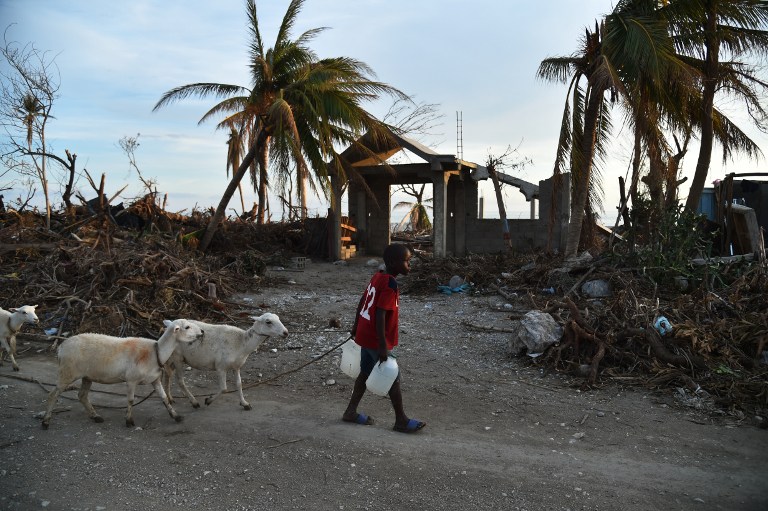
Haiti faces a humanitarian crisis that requires a “massive response” from the international community, the United Nations chief said Monday, with at least 1.4 million people needing emergency aid following last week’s battering by Hurricane Matthew. The storm left at least 372 dead in the impoverished Caribbean nation, with the toll likely to rise sharply as rescue workers reach previously inaccessible areas. / AFP PHOTO / HECTOR RETAMAL
PORT-SALUT, Haiti (AFP) – by Marc BURLEIGH
The first major handout of food aid took place along Haiti’s storm-wrecked southwest coast on Wednesday — but supplies were still far short of what was needed by the thousands of starving people.
Two trucks loaded with rice from the UN’s World Food Programme stocks and two others from private charities went by convoy to two hard-hit towns on Haiti’s Tiburon Peninsula: Port Salut and Roche a Bateau.
“It is very important to reach the most vulnerable communities and provide them with life-saving food assistance,” a WFP spokesman, Alexis Masciarelli, told AFP by telephone.
“These people have lost their homes and livelihood and sometimes have nothing else to eat than the coconuts and papayas from the fallen trees.”
In Port Salut, some in a crowd of people waiting in the frying sun for the food to be handed out confirmed that meager diet since Hurricane Matthew ravaged their crops, livestock and fruit trees on October 4.
“We need to eat, and also water and tin for our roofs,” one 18-year-old, Gedeon Rigab, said.
“I’ve eaten nothing but coconuts for five days,” said another, Djymi Forestal, 25.
Nuns at a Christian school in Port Salut, Saint Dominique’s College, supervised the unloading of the WFP truck.
They had been expecting four trucks to turn up, but had to make do with one. Most of the sacks of rice meant to feed a family of four for a month were emptied into smaller bags that would last just three days, so there was enough to hand out to everyone.
“We don’t have enough for everybody, so we have to divide it to give to more people,” the sister in charge, Marie-Nadia Noel, explained.
She said she feared the crowd could turn violent if only some people walked away with food.
To prevent fights and jostling that marred previous smaller handouts by US charity groups, just a handful of people at a time were let through the school’s metal gate to pick up their bags. The process, watched over by three Haitian policemen, went smoothly.
A Haitian health ministry official overseeing the distribution, Margareth Mallet, said the initial plan had been to give 250 families in Port Salut — around 1,200 people or a quarter of the town’s estimated population — enough to eat for weeks.
“We are trying to help the most vulnerable first, and over the coming days we will be accelerating distribution,” she said.
A WFP employee not authorized to speak to the media said that it was up to the local communities to work out how best to hand out the food.







